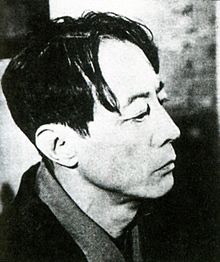Hagiwara Sakutaro

Hagiwara Sakutarō ( Japanese 萩 原 朔 太郎 ; born November 1, 1886 in Maebashi ; † May 11, 1942 in Tokyo ) was a Japanese poet and literary critic.
Hagiwara published tankas in literary magazines such as Shinsei ( 新 声 ) and Myōjō ( 明星 ) as a teenager . In 1913 his verses appeared in Kitahara Hakushū's magazine Zambon ( 朱 欒 ) and Maeda Yūgure's magazines Shika ( 詩歌 ) and Chijō Junrei ( 地上 巡礼 ). In 1914 he founded with Murō Saisei ( 室 生 犀 星 ) and Yamamura Bochō ( 山村 暮 鳥 ) the group of writers Ningyo Shisha ( 人魚 詩社 ), which published the literary magazine Takujō Funsui ( 卓 上 噴水 ). In 1915 he founded the Kanjō ( 感情 ) magazine with Murō Saisei .
His breakthrough as a poet came in 1916 with the volume of poetry Tsuki ni Hoeru , which was recognized by Mori Ōgai and Yosano Akiko . In addition to other collections of poetry, Hagiwara published literary criticism and literary studies.
In Hagiwara's honor, his hometown has been awarding the Hagiwara Sakutarō Prize for contemporary poetry since 1993 .
Works (selection)
- Tsuki ni Hoeru ( 月 に 吠 え る ), poems
- Aoneko ( 青 猫 ), poems
- Hyōtō ( 氷島 ), poems
- Shi no Genri ( 詩 の 原理 ) ("Principles of Poetry")
- Kyōshū no Shijin Yosa Buson ( 郷 愁 の 詩人 与 謝 蕪 村 , "The nostalgic poet Yosa Buson ")
swell
Web links
| personal data | |
|---|---|
| SURNAME | Hagiwara, Sakutaro |
| ALTERNATIVE NAMES | 萩 原 朔 太郎 (Japanese) |
| BRIEF DESCRIPTION | Japanese writer |
| DATE OF BIRTH | November 1, 1886 |
| PLACE OF BIRTH | Maebashi |
| DATE OF DEATH | May 11, 1942 |
| Place of death | Tokyo |
